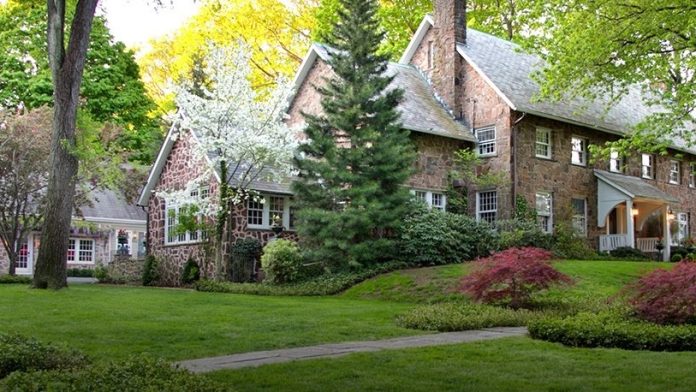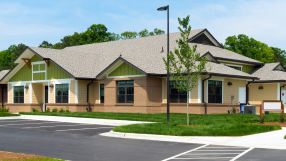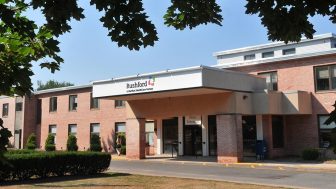Turnbridge New Haven
189 Orange Street
New Haven, CT 06510

About Turnbridge New Haven
Turnbridge New Haven provides addiction recovery services and mental health care for adolescents and young adults in New Haven, Connecticut, including dedicated programming for clients with co-occurring addiction and mental illness. Their gender-separate treatment models encompasses multiple levels of care, including inpatient, outpatient, and aftercare services.
Clients receive medical and mental health assessments, personalized care planning, and comprehensive case management. They also engage in intensive, trauma-informed individual, group, and family counseling. The program prioritizes independent living and recovery-focused life-skills training to promote clients’ sustained sobriety and successful reintegration into the home, school, workplace, and community. Their age and gender-specific education programs address topics such as emotional regulation, coping, self-care, relapse prevention, financial and household management, and job readiness. An array of evidence-based complementary therapies is available, including creative arts therapy, recreational therapy, and fitness and nutrition therapy. Their aftercare services ensure a complete continuum of care and may include 12-Step program facilitation and referrals for medical, mental health, and social service programs.
Their luxury treatment center features premium amenities, including hiking trails and on-site fitness and recreation facilities. Turnbridge New Haven is state licensed, LegitScript certified, and accredited by CARF and NAATP. Payment options include private insurance, financing, and self-pay.
Amenities

Art Therapy
Art and music are mediums that connect with our feelings, making them a great recovery tool during addiction t...reatment. Studies show that combining art/music and drug rehab can have a greater therapeutic impact than drug rehab alone, as you’re able to access parts of your brain and body that you may not have access to during traditional talk therapy. Benefits of art/music therapy include lowering stress and anxiety, promoting healthy neurochemicals, and providing stress relief.
Day School
Addiction treatment programs provide an opportunity to get your life back on track with access to school class...es or college courses. Whether you want to finish your GED or go back to school to learn a new trade, facilities often enlist tutors and teachers who are certified or licensed by the state to oversee self-study or distance-learning education.
Gym
When paired with cognitive-behavioral therapy, exercise can be an effective tool for overcoming addiction. Dru...g rehabs with a gym offer clients healthy ways to increase energy levels, balance the body’s stress hormone levels, and aid in the brain’s healing process.
Adventure Therapy
Hiking is a great way to relieve stress, get perspective, navigate challenges, connect with nature, and improv...e your health - all essential components of sustaining long-term recovery. Studies also show that the body releases endorphins during physical activities like hiking. These endorphins improve mood and act as a natural pain reliever.
Luxury Rehab
Luxury rehab is a form of treatment offered in a residential, resort-style setting. You’ll receive personali...zed treatment from staff and clinicians, have access to forms of treatment that go beyond what a typical inpatient rehab offers, and offer specific amenities like ocean views, large single occupancy bedrooms with private baths, and complementary spa treatments like massage, acupuncture, or reiki. Most luxury rehab centers have a limited number of beds.
Meditation Room
Yoga and meditation are great activities to support your recovery process during alcohol or drug rehab. These ...therapies have been around for centuries, and they are an effective way to improve well-being. Combining addiction treatment, yoga, and meditation can reduce cravings, improve sleep, relieve anxiety and depression, provide stress relief, promote relaxation, support emotional healing, and improve energy levels.
Music Room
Music can be extremely therapeutic, serving as a valuable healing tool and an integrative feature of a holisti...c treatment plan. A music room offers a large number of outlets, including singing, playing musical instruments, and listening to music.
Private Rehab
Private drug rehab provides a comfortable, secure environment that allows you to focus on doing the work to ge...t your life back on track. Benefits include a higher staff-to-client ratio, increased one-on-one time with therapists and healthcare providers, private rooms for clients, and customized forms of therapy.
Rec Room & Activities
Recreational therapy uniquely combines therapeutic interventions with an activity, like horse-riding, hiking, ...wilderness therapy, basketball, tennis, or a full workout. Benefits of recreational therapy include providing a healthy way to work through the emotions of recovery, learning to build and maintain relationships, improving communication skills, and building self-esteem.
Residential Setting
Residential drug rehab provides the comforts of home with the therapeutic support needed to successfully recov...er. Benefits of an inpatient program include increased safety, a higher success rate, and the time and distance given to focus on recovery. Residential drug rehabs are often the preferred method of treatment, as they can be tailored to meet specific needs, offer focused therapeutic care, and provide the necessary tools to sustain recovery.
Yoga Studio
Treatment centers with a yoga studio offer a special form of holistic therapy during the recovery process. Yog...a boosts mindfulness, a sense of calm, and healthy reflection during drug rehab via breathing exercises, stretching, and a progression of specific postures.Addiction Treatment Programs
Alcoholism
Alcohol rehab in Connecticut is not a one-size-fits-all solution. That’s why a variety of programs and treatment methods are available to meet you where you are. Through personalized treatment, alcohol rehab is designed to help you achieve sobriety and maintain long-term recovery from alcohol use disorder.Cognitive Behavioral Therapy (CBT)
In Connecticut, cognitive behavioral therapy helps individuals identify impulsive thoughts and feelings of fear and self-doubt. It equips them to manage these negative thoughts and feelings without the use of substances.EMDR Therapy
EMDR Therapy is a neurobiological treatment modality used to address trauma disorders and related mental and behavioral health challenges. Short for eye movement desensitization and reprocessing, EMDR is designed to help clients cope with distressing memories and emotions, including fear, sadness, and anger. EMDR may help clients in addiction recovery manage the psychological and emotional triggers that contribute to substance misuse and/or addiction relapse.Fitness Therapy
Fitness therapy is an evidence-based complementary approach to addiction recovery and mental health care. Based on mounting scientific evidence of the benefits of physical activity in improving mood, enhancing clients’ sense of wellbeing, and decreasing depression and anxiety, fitness therapy encompasses a wide spectrum of intensities, from gentle yoga, qigong, and tai chi to weight training, kickboxing, and other highly physical activities.Men's Rehab
Adults who attend men’s rehab in Connecticut have the opportunity to connect with other men who are struggling with similar addiction issues. This is important for recovery, as men are often more comfortable talking about their struggles with other men.Opioid Treatment
When you attend opioid rehab in Connecticut, you’re provided with the tools that are necessary to break free from opioid addiction. Treatment offers accountability, structure, and a sense of community. Methods typically include medication assisted treatment, individual therapy, and group counseling.Women's Rehab
Women often find it easier to work through their addiction issues in women’s rehab in Connecticut. Surrounded by other women who understand their struggles, they can feel free to share openly and find support.Teen & Adolescent Program
If you are looking for a young adult program in Connecticut, many options are available. Programs include inpatient, partial hospitalization programs (PHP), intensive outpatient programs (IOP), outpatient, aftercare, and dual diagnosis.Levels of Care
Inpatient Rehab
Inpatient drug rehab in Connecticut is the most intensive level of care for addiction treatment. Upon admissio...n, they engage in extensive psychotherapy, receive recovery-focused life skills training, and participate in evidence-based complementary therapies, such as meditation, massage, acupuncture, and/or animal, creative arts, recreational, and experiential therapy.Outpatient Rehab
Many individuals turn to outpatient rehab in Connecticut after they complete an inpatient program. This treatm...ent is less intensive and usually involves attending several counseling sessions per week and attending a support group such as NA or AA. Outpatient rehab may be short or long-term, depending on the needs of the individual.Aftercare & Alumni Program
Once you’ve completed rehab treatment, you must learn how to manage stress and life challenges without relap...sing. Aftercare rehab in Connecticut is designed to provide the support you need for this process. It may include financial, educational, career, social, and mental support. Many people remain in this care for a year after initial recovery.Dual Diagnosis & Mental Health
When you have a co-occurring disorder, you have both a substance abuse disorder and a mental health disorder. ...Dual diagnosis in Connecticut specializes in treating both conditions simultaneously, which is crucial for successful recovery.Drug & Alcohol Intervention
For those looking to get a loved one started on a path toward recovery, intervention services in Connecticut c...an prove invaluable. Professional intervention specialists can help you facilitate an intervention, access resources to develop a treatment plan, and assist with admittance to drug rehab in Connecticut.Sober Living
Sober living in Connecticut offers an interim step for the first few months of your recovery journey. It invol...ves living in a supervised, sober residence that has structured rules and required 12-step meetings. Typical house rules include no drugs or alcohol, random drug tests, and involvement in work, school, or an outpatient rehab program.Accreditations

LegitScript Certified

NAATP

CARF

State License #:
SA.0000524Insurance
Anthem Blue Cross And Blue Shield
 Payment Plans & Financing
Payment Plans & Financing
For those who are underinsured or uninsured, paying the total cost of a rehab program up front is not feasible.... Fortunately, many alcohol and drug rehabs make financing available to potential clients through private loans, in-house payment plans, or partner lenders. You can choose a finance package that lets you start treatment immediately and pay for it later.
 Private Insurance
Private Insurance
Private insurance is one of the best ways to lower the cost of alcohol and drug rehab in Connecticut. Keep in ...mind, however, that coverage rates and other treatment details will differ, depending on your insurance carrier and policy. Be sure to verify your coverage details before entering a treatment program.
 Self-Pay Options
Self-Pay Options
If you are under- or uninsured, self-pay options can help keep your out-of-pocket costs at an affordable level... for alcohol or drug rehab in Connecticut.Contact Turnbridge New Haven




